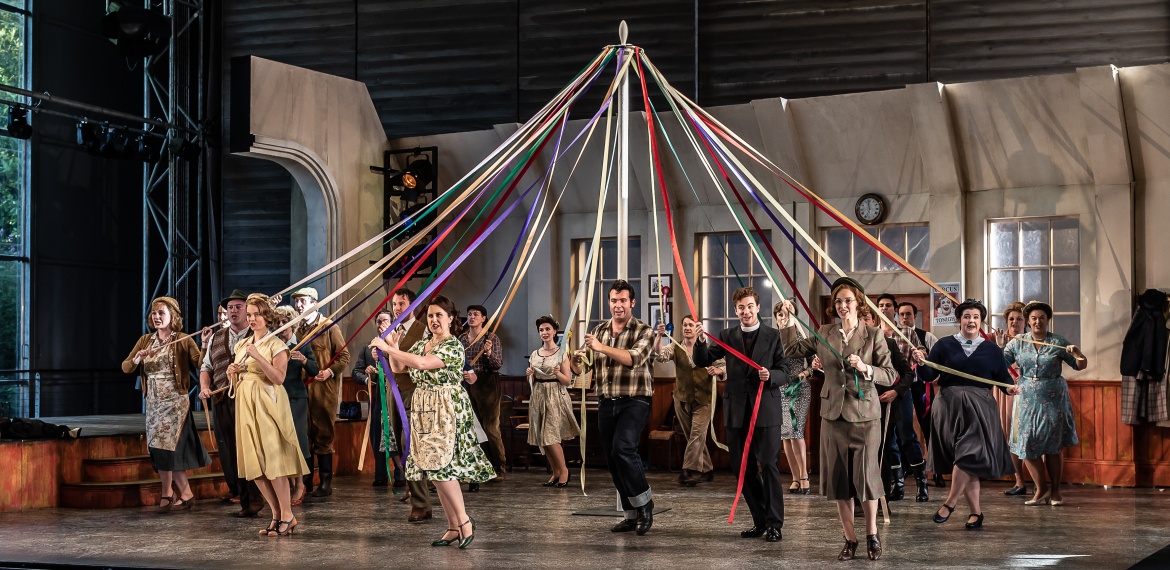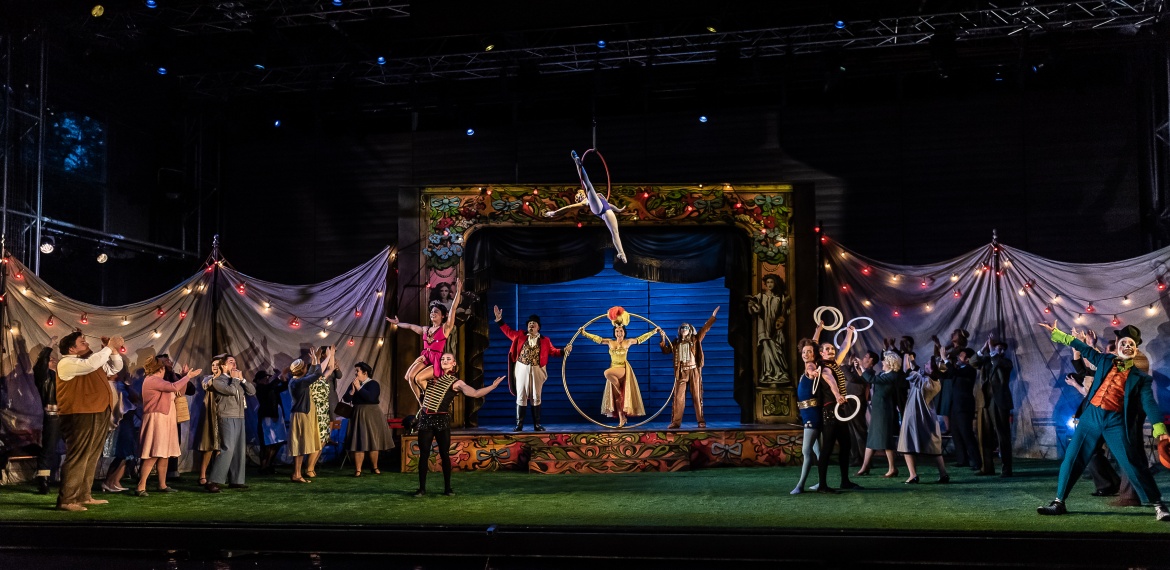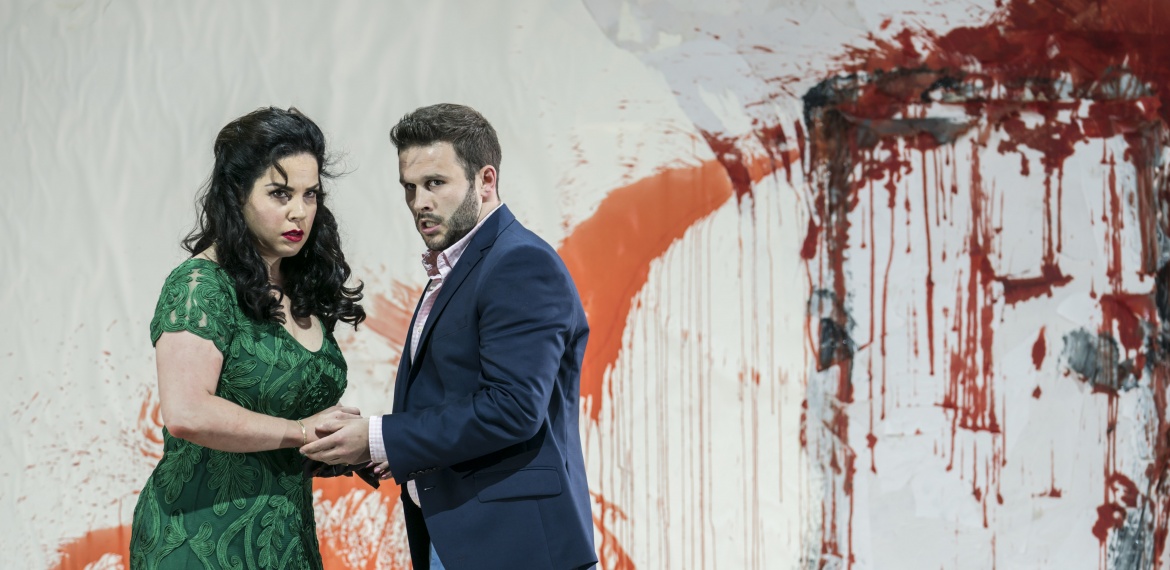Garsington Opera is celebrating its thirtieth birthday this summer, secure in its new home on the Getty estate at Wormsley. What started life as a few performances on a terrace in Leonard Ingrams back garden has developed into a festival of exceptional musical standards which commands international respect. The new opera house (which it is, regardless of what title it was originally given) has proved itself to be a highly versatile space with splendid acoustics, and one which has encouraged the development of new approaches to staging and to relationships with other organisations.
The continued involvement of the Philharmonia Orchestra will come to fruition in the 2020 season when they will support three of the four operas – the English Consort playing for the new Mozart production. This is in no way to disparage the Garsington Opera Orchestra, which has given sterling support over the years, but marks a shift towards a longer term professional partnership.
I have been reviewing Garsington Opera since 1996 when I first came up for Albert Herring and it has been the highlight of my summers ever since. The transition to Wormsley was remarkably seamless in retrospect and the subtle annual upgrading to the building and surroundings always add to the experience. Even a summer where it poured with rain every time I was there did not deter my enthusiasm or damage the performance – unlike the first Fidelio I attended in the old house which was washed out when the pit flooded and the rain drummed on the roof louder than the music. No chance of that now at Wormsley and though blankets are still provided you would need to be very unlucky to really need them.
The season opened this summer with Smetana’s The Bartered Bride, a work surprisingly rarely seen in this country given its overt festival appeal with familiar music, lots of dancing and a real circus! Director Paul Curran had moved the story to an English village c1960 allowing the chorus to create a wide range of individuals who never needed to be simple stereotypes. The opening conceit – the villagers are learning a Czech dance based on Smetana’s music – gently makes the transition from central Europe to middle-England but for the rest of the evening the local setting is remarkably effective. The only minor quibble for someone of my age is that pubs in that period rarely saw that many women in the public bar – all rather too European for the period!
However the first act is delightful with Brenden Gunnell’s emotionally charged Jenik taking his frustrations out on the corned-beef sandwiches with aplomb, while Natalya Romaniw’s Marenka tries to keep him under control while constantly wanting to show how much she loves him. The relationship blossoms well across the evening and is very strongly sung and characterised throughout. Joshua Bloom’s brash Kecal throws his weight about and has a vast bass voice in keeping with his character. Stuart Jackson underplays Vasek’s potential as the village idiot, making him more appealing and sensitive that is sometimes the case though his very large physical presence makes him a gentle giant without any effort. The circus in the final act is magnificent and the dancing throughout compellingly effective. The Philharmonia Orchestra under Jac van Steen gave an emotionally charged and frequently thrilling account of the score. I don’t know if this is to be recorded but it certainly deserves to be.
Garsington Opera have had an uneven history where Mozart is concerned ranging from John Cox’ definite Le Nozze di Figaro to some less than involving other stagings. Michael Boyd’s new Don Giovanni looked at first as though it was going to be firmly in the latter camp with its Jackson Pollock paint flinging and its unconvincing setting of picture frames. However once it got firmly into its stride – in this case after the death of the Commendatore – it suddenly flowered dramatically and was gripping for the rest of the evening. When the quality of acting and singing is added to this, it really became a very impressive evening. At its heart was the sense of ensemble rather than individual characters. The up-dating worked perfectly well when the Don becomes a vile, louche, aggressive serial rapist who clearly has too much money and no sense of purpose other than to indulge himself. For once, the catalogue aria comes across as repellent rather than comical. This is not to imply that Michael Boyd takes a significantly feminist approach, just that we are as an audience far more aware of the way individuals abuse power. There was always the potential problem of the conclusion to the work – if the audience don’t believe in hell and damnation, what happens to the Don?- but Michael Boyd took this at face value with the Don dragged off screaming attached to the metal ladder and the evening ended there, as did Mozart’s version in 1788. There is no comfortable denouement, no winding up of loose ends, just a sense that one problem has been dealt with even if many more remain.
The young cast make much of the dramatic interplay. Jonathan McGovern’s Don is highly mobile as well as vocally exciting, and always just one step ahead of the capable Leporello of David Ireland. Trystan Llyr Griffiths is one of the most convincing Don Ottavio’s I can recall. His singing is magnificent and he is a genuinely convincing foil perfectly capable of standing up to Giovanni . Thomas Faulkner’s Masetto is equally virile and his anger is always dangerous, even when Zerlina appears to get the better of him.
Camila Titinger’s Donna Anna is strongly sung, her character hinting at rather than over-playing her aristocracy. Sky Ingram’s Elvira never lets us forget her passion for Giovanni is very real even when she knows how despicable he is. Her Mi tradi was dramatically carried throughout and her presence on stage never in doubt. Mireille Asselin’s Zerlina was a very different kettle of fish. A working class woman who has to use all her wiles to maintain her place and dignity, as much within her own people as with the wider social world. Paul Whelan’s Commendatore is very much of an older generation, his return as a statue placing him firmly in the world of elder statesmen passing judgement.
Douglas Boyd moved the score on with consummate skill, allowing moments of ornamentation to peep through without any sense of indulgence. The Garsington Chorus were their usual joyous self.
Next time I will be covering Offenbach’s Fantasio and Britten’s The Turn of the Screw.



